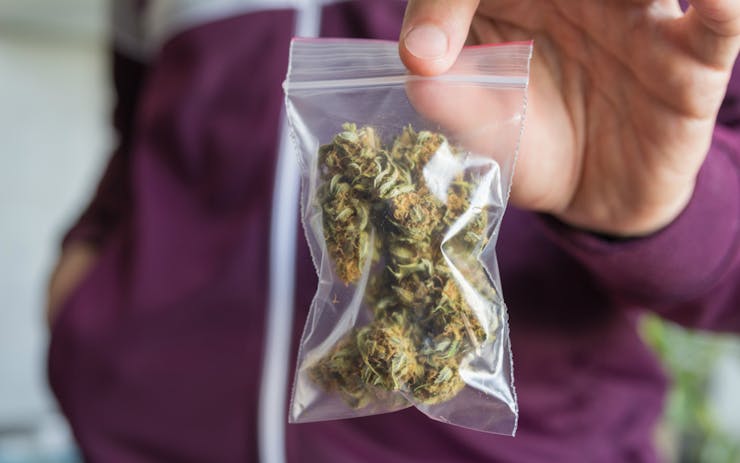California’s new cannabis market brings a litany of new rules, including some aimed at cracking down on the whimsy of weed packaging. Cartoon logos will be no more, and it will be RIP to the dime bag—as we know it, at least.
The new regulations will eventually mean big changes in how producers and processors package their wares, with new mandates around labeling and child safety. But during the first several months of legal sales, says Nick Kovacevich, CEO of packaging manufacturer Kush Bottles, it will likely be dispensaries that see additional cost.
“Most of the burden upfront is going to be on the retailer,” he said.
Under rules for the state’s new marketplace, set to launch in some parts of the state on Jan. 1, customers’ cannabis purchases must be in child-resistant “exit bags” when they leave a store. Products must also be placed in an opaque container, like the brown or white paper bags already in use by many medical dispensaries.
“Obviously now these exits bags are going to be very popular in the state,” Kovacevich said.
In Colorado, Kush Bottles' business exploded after legalization in that state, increasing by a factor of 20.
While the change will ultimately make its way through the supply chain, a temporary phase-in period allows some cannabis products to be sold in their existing packaging. The phase-in period allows existing companies to burn through their supplies of bottles and baggies while they prepare for permanent changes.
“In general, the state’s intention was to give everyone this ramp or path into compliancy, and they want it to be a six-month path,” Kovacevich said.
In the meantime, the burden is on retailers to ensure that everything leaving the store is up to state standards.
In Los Angeles, cannabis company MedMen is preparing to equip all five (soon to be six) of its California dispensaries with the necessary packaging. Daniel Yi, MedMen’s communications director, said the company has purchased 100,000 exit bags with childproof zippers to be used with all products that don’t meet the new requirements. He expects that will be enough to cover the first six months of the year, until non-compliant products have cycled through.
“All of this adds cost to our operations and adds cost to everyone’s operations,” he said. “But that’s what it means to be a part of a legal industry.”
Judging from Kush Bottles’ website, MedMen isn’t alone. The packaging company’s current top sellers include exit bags, child-resistant “Kush Canisters,” and child-resistant pre-roll tubes. The new regulations also require cannabis products be labelled with a new warning symbol, which Kovacevich said his company will be printing on stickers.
“We have so many different products that meet and exceed the regulations,” he said.
While the changes could raise costs for some in the industry, Kush Bottles and other packaging manufacturers could see a windfall. Kovacevich estimates the Los Angeles-based company’s business could grow by a factor of five to 10 following California’s legal-market launch. (In Colorado, the company’s business exploded after legalization in that state, increasing by a factor of 20.) Company President Ben Wu, Kovacevich noted, holds a seat on the state Bureau of Cannabis Control’s Advisory Committee.
At MedMen, Yi expects vendors will begin to bring in new, appropriately packaged products before long. All new products received on or after Jan. 1 must be compliant with the emergency regulations, he said, adding that in the meantime, it will be up to the company’s purchasing team to be “very well trained” on state regulations.
Another major packaging change will fall on the shoulders of cannabis suppliers starting early next year, when bulk, “deli-style” cannabis sales become illegal. While it has been common for cannabis to be sold out of bulk jars, retailers will be forced to switch to products that are divvied up and prepackaged for sale.
“Anything new that’s purchased [by retailers] after Jan. 1 needs to be purchased in a pre-packaged format, not a bulk format,” Kovacevich said.
Over time, Kovacevich anticipates the financial burden of packaging will migrate slowly from dispensaries to suppliers. Dispensaries could potentially speed the shift, he added, either by paying lower wholesale prices for products that arrive unprepared for sale or by simply choosing to work only with companies that comply with the new state regulations.





